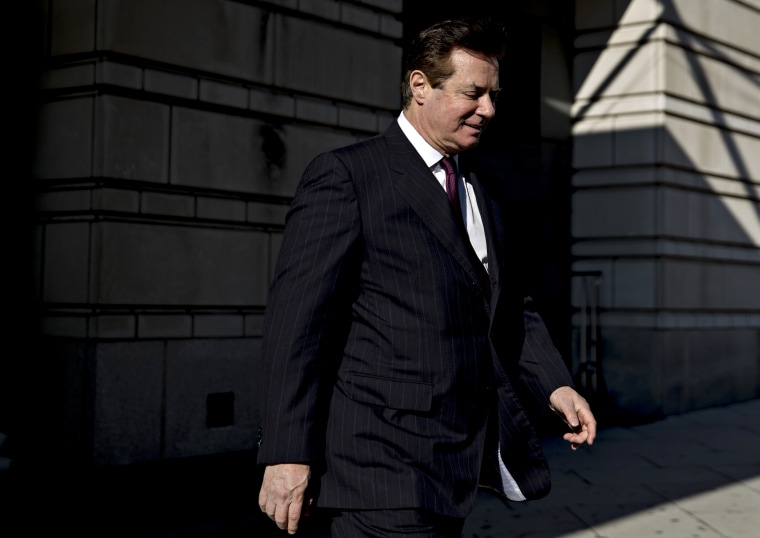Former Trump campaign manager Paul Manafort told his longtime associate Rick Gates — after they were hit with federal charges — not to plead guilty because the president's personal lawyer had assured him they'd "be taken care of," according to the special counsel's report.
The exchange took place in January 2018, three months after Manafort and Gates were indicted on 12 federal counts including conspiracy against the U.S. and money laundering, says the report, which was released to the public in partially redacted form Thursday.
"Manafort told Gates that he had talked to the president's personal counsel and they were 'going to take care of us,"' according to Robert Mueller's report.
Manafort went on to say that it would be "stupid" to plead guilty, according to the report's characterization of what Gates told investigators. Manafort emphasized that he had been in touch with the president's personal lawyer and repeated that "that they should 'sit tight' and 'we'll be taken care of,'" Mueller's report says.
Gates responded by asking Manafort if anyone mentioned pardons. Manafort said no one used that word, the report says.
Gates detailed the conversation to federal investigators in April 2018, according to the report. The special counsel's office deemed Gates' information "reliable," the report says.
But Manafort told Mueller's team that he had no such conversation with Gates. "Manafort also said he hoped for a pardon but never discussed one with the President," the report says.
Manafort's lawyer, Kevin Downing, did not immediately return a request for comment.
John Dowd, one of the president's personal lawyers at the time, told NBC News that he has never talked to Manafort or Gates. Michael Cohen, who split with the president after pleading guilty to charges brought by Mueller, did not return a request for comment. Nor did Jay Sekulow, who is still one of Trump's personal attorneys.
Gates' lawyer, Thomas Green, declined to comment.
The conversations hinting at a presidential pardon were among several other revelations related to Manafort that are contained in Mueller's long-anticipated report.
Manafort, a longtime GOP operative, is serving a prison sentence of seven and a half years after he was ensnared in the special counsel's probe. Manafort agreed to cooperate with the special counsel's office after a Virginia jury found him guilty on eight counts of fraud, but Mueller later said that the former campaign chairman lied to investigators on a host of matters.
Gates pleaded guilty to conspiracy and lying to investigators and agreed to cooperate with prosecutors. He has not yet been sentenced.
Manafort was motivated to join the Trump campaign by reasons that went beyond his allegiance to the Republican party, Mueller found.
According to the report, Gates told investigators that "Manafort said being hired on the campaign would be 'good for business' and increase the likelihood that he would be paid the approximately $2 million he was owed for previous political consulting work in Ukraine."
The Mueller report also provides new details on Manafort's contacts with Konstantin Kilimnik, a former associate who the FBI says has ties to Russian intelligence. Kilimnik has denied having any links to Russian spies.
Mueller's prosecutors had previously revealed that Manafort provided Kilimnik with internal polling data and held a meeting with him at the members-only Grand Havana Room in New York City in August 2016.
During the sit-down, the Mueller report says, Manafort briefed Kilimnik on "the state of the Trump campaign and Manfort's plan to win the election."
"That briefing encompassed the campaign's messaging and its internal polling data," the report adds.
Gates, who also attended the meeting, told investigators that the men discussed "battleground" states, which Manafort identified as Michigan, Wisconsin, Pennsylvania and Minnesota.
Gates also told Mueller's team that Manafort instructed him around April 2016 to send Kilimnik internal polling data so the Russian national could share it with Ukrainian oligarchs. Gates believed Manafort saw the sharing of such materials as a way to get in the good graces of the wealthy Ukrainians.
"Gates thought it was a way to showcase Manafort's work, and Manafort wanted to open doors to jobs after the Trump Campaign ended," the report says.
In the meeting, Manafort and Kilimnik also discussed a plan to provide Russia a "backdoor" means to control eastern Ukraine. The proposal involved establishing an autonomous region in the fractured country and installing deposed Ukrainian President Viktor Yanukovych as its leader, the report says.
The Grand Havana Room gathering marked the second time Manafort met with Kilimnik during the campaign, the report says. Manafort went on to communicate with Kilimnik at least four more times related to the Ukraine plan.
In one exchange, the report said, Kilimnik wrote to Manafort that "all that is required to start the process is a very minor 'wink' (or slight push) from DT," the president's initials.
But it also notes that the investigation found no evidence that Manafort passed on the Ukraine proposals he discussed with Kilimnik to anyone in the campaign.

